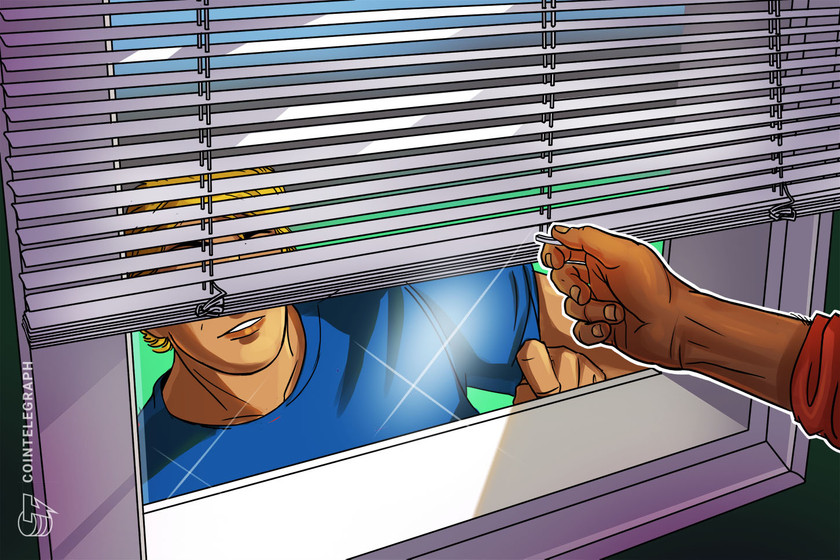 A recent update of Phantom, the signature self-custody wallet for the Solana blockchain, logged a meme coin trader out of his account, causing him to lose $1 million. 0xFiyopi, the affected trader, stated that he lost access to these wallets because he did not save the associated seed phrase. Phantom Wallet Update Causes Losses for […]
A recent update of Phantom, the signature self-custody wallet for the Solana blockchain, logged a meme coin trader out of his account, causing him to lose $1 million. 0xFiyopi, the affected trader, stated that he lost access to these wallets because he did not save the associated seed phrase. Phantom Wallet Update Causes Losses for […]

MoonPay Balance will support deposits and withdrawals in euros and British pounds, with future plans to expand to the US.
Cryptocurrency infrastructure firm MoonPay is moving to improve self-custodial spending by introducing a new payment solution allowing users to hold and spend fiat balances.
On Nov. 13, MoonPay officially introduced MoonPay Balance, a new payment tool enabling users to store and spend fiat balances on MoonPay and use it as an entry point to interact with decentralized finance (DeFi).
The new solution empowers users to spend balances through MoonPay’s direct integration with non-custodial or self-custodial wallets like MetaMask, Phantom and Bitcoin.com, according to an announcement shared with Cointelegraph.

According to Cyvers, the attacker caused malicious code to be inserted into multiple app user interfaces, allowing the exploiter to fool users into confirming transactions.
The ‘Ledger hacker’ who siphoned away at least $484,000 from multiple Web3 apps on Dec. 14 did so by tricking Web3 users into making malicious token approvals, according to the team behind blockchain security platform Cyvers.
According to public statements made by multiple parties involved, the hack occurred on the morning of Dec. 14. The attacker used a phishing exploit to compromise the computer of a former Ledger employee, gaining access to the employee’s node package manager javascript (NPMJS) account.
When a developer first writes their app, they usually install a connect kit through Node Package Manager (NPM). After creating a build and uploading it to their site, their app will contain the connect kit as part of its code, which will then be downloaded into the user’s browser whenever the user visits the site.

Phantom, a leading self-custody wallet in the Solana (SOL) ecosystem, is reportedly expanding to support the Ethereum (ETH) and Polygon (MATIC) chains. Phantom told TechCrunch that it plans to support the Ethereum and Polygon blockchains beginning May 1st on both iOs and Android devices. Says Phantom, “The Phantom multi-chain is now available everywhere that MetaMask […]
The post New MetaMask Competitor? Top Solana Wallet Phantom Goes Multichain With Expansion to Ethereum and Polygon appeared first on The Daily Hodl.

Solana Labs founder and CEO Anatoly Yakovenko said claims that Solana's network outages were caused by on-chain voting were born out of "pure ignorance."
Anatoly Yakovenko, the founder and CEO of Solana Labs has downplayed claims that Solana's network outages were being caused by a high volume of validator messages and its on-chain voting system clogging its consensus layer.
While the Solana Foundation confirmed in a Feb. 27 post that the “root cause” of the recent 20-hour network outage is still not clear, the CEO responded to speculation that Solana’s decision to include on-chain votes as transactions is a “massive design flaw” that has led to its many outages.
The controversial thread in question was posted by Twitter user DBCryptoX earlier on Feb. 27 days after Solana's 20-hour network outage, suggesting that the high volume of validator messages and on-chain votes were clogging the network.
1/Yesterday #Solana had another 20 hour outage
— DBCryptoX ⚡️ (@DBCrypt0) February 26, 2023
Just one of about a dozen times the ⛓️ has gone down. But why?
All part of a massive design flaw that I will try to break down in this
So let’s get into it… pic.twitter.com/KmeUPnnlZJ
However, Yankovenko in a response Tweet some 20 minutes later called the theory as coming from “pure ignorance.”
In short, he explained that the votes — which are part of a “single giant quorum” — contribute to provide an “exceptional level of security and high throughput and low fees” simultaneously.
Why are votes transactions? Every thread that I've seen that talks about this comes form pure ignorance.
— toly (@aeyakovenko) February 27, 2023
Classic BFT consensus requires quadratic messaging overhead.
The more nodes you have in the same quorum, the part of the network that agrees on the state, the more messages… https://t.co/8lOhICb8mn
However, Yakovenko didn’t exactly refute DBCryptoX’s claim that 90-95% of transactions on Solana comprise these validator messages and on-chain votes, which, DBCryptoX suggests has helped “bog down the system.”

DBCryptoX also claimed that the network outages were last 20 hours because it takes considerable time for validators to meet and reach a consensus (and thus a solution) using off-chain means, such as a messaging system like Discord.
Related: Solana Spaces will close New York and Miami stores 7 months after opening
Many commentators on DBCryptoX's initial post also appear to have disagreed with their theory.
Software engineer Alex Kroeger of Solana-powered Wallet Phantom said that there is likely no singular cause of the network outages and that validators of proof-of-stake systems need a lot of network communication to achieve validation.
While the network officially restarted on late Feb. 25, it appears as though members of the cryptocurrency community are getting tired of the frequent network outages on Solana.
Cointelegraph reached out to Solana Labs for comment but didn't receive a response by the time of publication.

Norby said the “experiment” was part of a plan to onboard more people onto Solana, but the stores didn’t bring in as many users as they initially hoped.
Solana Spaces will close down its two Solana (SOL)-themed, community-oriented retail stores in New York City and Miami at the end of the month, as the physical stores didn’t onboard as many users as initially anticipated.
Solana Spaces tweeted the news on Feb. 21, sharing a note from founder Vibhu Norby explaining the reasons behind the store shutdowns.
The following is a note from our founder, @vibhu.
— Solana Spaces (@solanaspaces) February 21, 2023
Dear @solanaspaces community,
We’ve made the difficult decision to sunset our stores in NYC and Miami by the end of February, and to pivot our Solana onboarding efforts into digital products like DRiP, our free NFT product with… https://t.co/kjNu9Ay4Gk
Norby — who founded Solana Spaces in early 2022 — explained that the company reached an “inflection point” with the stores, prompting them to shift its investment focus to “DRiP,” the firm’s new nonfungible token artwork airdrop platform.
“While our stores onboard between 500 and 1,000 people per week, DRiP onboards that same quantity EVERY DAY,” Norby said, explaining the decision to shift its investment focus.
The decision to close the shops — located in the Hudson Yards neighborhood of Manhattan and the Wynwood section of Miami — was made “a few weeks ago,” and they will “sunset” at the end of February, Norby said.
The ambitious initiative was relatively short-lived, with the two stores having only officially opened in late July and August in New York and Miami respectively.
Norby said the “experiment” was part of a broader plan to onboard more people into the Solana and Web3 ecosystem:
“Our endowed mission from day one was to experiment with new and disruptive models to bring people to Web3, and to serve the community on behalf of the Solana Foundation.”
“As I told people often, as awesome as the stores were, if we found a more efficient way to bring people into Solana, we would throw our efforts at that,” he added.
But as he has since realized, the firm’s efforts may achieve better results in the digital realm with DRiP.
The Solana-themed stores offered customers the opportunity to partake in all things from in-person wallet onboarding tutorials, earning rewards, merchandise shopping and attending events.

When Solana Spaces opened its first New York-based store in late July, Norby hoped the store would bring in more than 100,000 people to Solana per month.
However, Norby stated in his letter that only 75,000 people managed to walk into the store over the course of its seven-month tenure.
Related: The state of Solana: Will the layer-1 protocol rise again in 2023?
The startup was sponsored by the Solana Foundation, the Solana-based wallet provider Phantom and the native crypto exchange Orca, and while it didn’t work out, it did appear to have won over a lot of fans.
Just visited for my 2nd time a few days ago!
— Investrepreneuer.sol (@LordHearMePray) February 15, 2023
Thank you for the experience!
Every time I come to Miami I have to make a pilgrimage to SolanaSpaces pic.twitter.com/ugCqbSyIzg
Several Solana-native industry players, such as the videogame projects Star Atlas and Aurory, thanked Solana Spaces for its contribution to the ecosystem.
We're sad to hear the news of @solanaspaces closing their Miami and NYC stores The events that Star Atlas attended and hosted there were beyond incredible!
— Star Atlas (@staratlas) February 21, 2023
Even so, we can't wait to see what comes from their pivot to DRiP! https://t.co/4voal4yzfC pic.twitter.com/bXV8PKG6LE
The closure comes as the prolonged crypto winter has caused many industry-leading companies to lay off staff and close down offices all around the world.

New features aimed at protecting users come amid recent crypto thefts and phishing attacks targeted at well-known crypto executives and influencers.
United States-based crypto exchange Coinbase has become the latest crypto wallet provider to roll out transaction previews and blocklists amid a rise in crypto thefts.
On Jan. 30, the crypto exchange announced it had integrated a new suite of safety features to its wallet app to make it easier for users to spot and take action on potential foul play from scammers.
Such integrations include a transaction preview feature which gives the user an estimation of how users “token and NFT balances will change” during a transaction before the confirm button is hit.

The firm has also rolled out token approval alerts, which make it clear to the user when a decentralized application dApp is requesting approval to withdraw tokens and nonfungible tokens (NFTs).
Additionally the firm has also introduced new layers of permission management that enable users to revoke dApp connections directly from the app to help minimize “exposure to potential vulnerabilities.”
The crypto exchange joins the ranks of several other crypto wallet providers that have either rolled out or announced similar features aimed at combating crypto scams and phishing attacks, including Solana-based Phantom, Web3 wallet provider Ember and Bitski.
Just two days after Moonbirds creator Kevin Rose admitted to losing $1.1 million in NFTs via a targeted phishing attack, Phantom reminded users on Jan. 27 that its wallets are protected with a number of security features which include transaction previews, an open source blocklist, NFT spam reporting and burning.
The firm explained its transaction preview feature: "when you take an action in Phantom, like minting an NFT, we scan your transaction and proactively find anything that looks fishy. Website looks fishy? You get a warning. Trying to obfuscate code? Warning. Interacting with suspicious tokens? Warning.”
While the open-source blocklist consists of a “community-maintained list of malicious domains” that Phantom blocks users from mistakenly connecting with.
12/ We’re proud of the security features we have implemented, but this is only the beginning.
— Phantom (@phantom) January 26, 2023
We will continue to work tirelessly to protect our users with best-in-class security features, education, and support to make everyone’s journey through web3 safe, easy, and fun.
Tweeting on the same day as Phantom, Web3 wallet provider Ember detailed the list of its own security tools.
The list includes translation previews, token and NFT locking to stop assets being drained as part of malicious transactions, and approvaling revoking.
5/7) As well, Ember allows you to lock your NFTs and tokens, which disables the ability to send or sell them until they have been unlocked which requires your authentication to do so
— Ember (@EmberWallet) January 27, 2023
This means that if you do sign a malicious transaction, your locked assets can't be drained
On Jan. 24, Bitski also indicated that it was working on similar integrations via its 2.0 wallet, with product designer Jasmine Xu noting that this will cover “self custody, dapp browser, transaction simulation previews, notifications about account activity, in-app burner vault, and a bunch more in a few weeks.”
Related: 5 sneaky tricks crypto phishing scammers used last year: SlowMist
In its most recent blog post, Coinbase said in the coming weeks, the firm will launch a feature so that users can “view and revoke existing token balances.”
These types of features are important for crypto and NFT users, as scammers/hackers deploy a wide array of tools to hijack transactions and get funds sent to them instead of the originally intended destination.
Popular methods that dupe even experienced users consist of phishing attacks, scam airdrops directing people to click on malicious links and malware.

Crypto wallet Phantom is expanding its services to the Ethereum (ETH) and Polygon (MATIC) blockchains, bringing competition to other popular non-custodial wallets like MetaMask. Announcing via Twitter, Phantom says it was founded with the intention of eventually expanding into a multichain existence, starting with the Ethereum network. “Phantom was actually founded with the intent of […]
The post MetaMask Meets New Competitor As Crypto Wallet Phantom Expands to Ethereum (ETH) and Polygon (MATIC) appeared first on The Daily Hodl.

Phony non-fungible token (NFT) airdrops are reportedly targeting Solana (SOL) wallets with malware to steal passwords and digital assets. According to a new report by BleepingComputer, attacks began two weeks ago and pose as needed Phantom security upgrades titled “PHANTOMUPDATE.COM” or “UPDATEPHANTOM.COM.” “When opening the NFTs, wallet owners are told that a new security update has been […]
The post Fake NFT Airdrops Attempting To Compromise Solana (SOL) Wallets and Siphon Crypto Assets: Report appeared first on The Daily Hodl.

The Phantom wallet app has launched a new Burn Token feature, allowing users to remove spam NFTs sent by scammers.
Solana-based wallet provider Phantom has launched a new burn feature allowing users to remove spam non-fungible tokens (NFTs) sent by scammers.
According to an Aug. 18 blog post from the Phantom team, the new feature is accessible via the Burn Token tab in the Phantom wallet app, allowing users to receive a minuscule deposit of Solana (SOL) each time they use it.
“We’re still in the Wild West days of Web3. As the crypto ecosystem grows, so have the number of bad actors looking for ways to steal user’s funds. The rapid growth in popularity of NFTs has led to an increasingly prevalent method of attack for scammers – Spam NFTs.”
Phantom noted that the issue has been particularly prevalent on Solana due to its low transaction fees, with bad actors often airdropping supposedly free NFTs en masse which contain malicious links.
Spam NFT generally prompt the receiver to click a link to mint a free NFT, however, if they complete the process, their funds end up being drained from their wallet. Alternatively, the link will ask the receiver to input their seed phrase, resulting in the same outcome.
“These scams are becoming increasingly more sophisticated. For instance, after a contract address and domain are identified as malicious, scammers can change the metadata of an NFT to try to avoid being blocklisted. It can feel like an endless game of whack-a-mole,” the blog post read.
The move is part of a broader initiative by Phantom to counter spam NFTs and bad actors in the space. The team stated that it also fights scammers through its phishing warning system, which issues warning to users on “any malicious transactions that could compromise their assets or permissions” after clicking on dubious links.
5/ While we’re introducing NFT burning and improved phishing alerts today, we’re not stopping there. Users can look forward to more automated spam detection in the future.
— Phantom (@phantom) August 17, 2022
To read more about how we're fighting wallet spam, check out our latest blog post:https://t.co/OZYOEvVIFH
The post added that Phantom is currently collaborating with Blowfish to improve how “we alert users to phishing attempts.”
“While we’re introducing NFT Burning today, we’re not stopping there. Users can look forward to more automated spam detection in the future. Using providers like SimpleHash and our own internal reporting, we will be able to gauge if an NFT is likely to be spam,” the post read.
Related: Crypto spam increases 4,000% in two years — LunarCrush
Phantom is one of the most popular wallet providers for Solana-based NFTs and decentralized fiance (DeFi), with more than 2 million monthly active users according to the firm.
At the start of August competing wallet firm Slope suffered a security exploit which saw an estimated $8 million worth of funds drained on the Solana blockchain.
In a post mortem analysis, Solana’s head of communications Austin Fedora found that 60% of the victims of the attack were Phantom users, despite the issue originating from Slope.
Solana hosted the second largest amount of NFT sales volume in July at $56.1 million, behind only Ethereum which posted a whopping $535.6 million according to data from CryptoSlam.